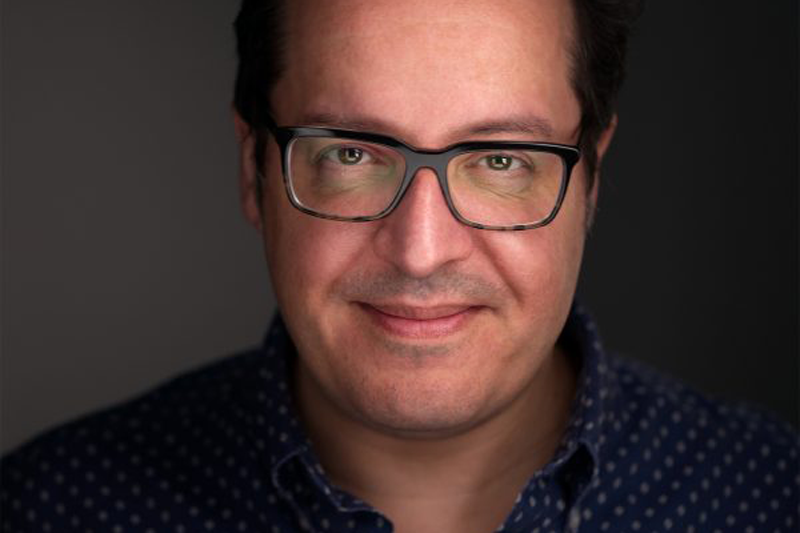One of the biggest white whales of my author career has been the release of audiobooks. The desire has persisted from day one, but as any author can attest, they are extremely difficult to produce. Thankfully, there are talented voice actors like Hannibal Hills out in the wild. He runs the Royal Wave Media production company, and as luck would have it, he’s also a fan of Max and the Multiverse. Mr. Hills reached out to me about narrating the saga and the rest, as they say, is history. Hearing him bring these nutty characters to life has been one of the highlights of my authorship. I wanted to learn more, so I invited him for a chitchat.

What do you like about audiobooks?
As a listener, I appreciate how audiobooks allow me to learn, be entertained, and enjoy stories on the go. I often listen while driving, which amounts to quite a few hours each week.
From a narrator’s perspective, audiobooks provide one of the most creative outlets for a voice actor. While performing on stage or screen, we are often limited by our age, gender, and physical appearance. However, when narrating an audiobook, we have the opportunity to play all the parts. The challenge of portraying characters of different ages, genders, and even species never gets old. Moreover, I have always loved the process of storytelling, of finding the overarching rhythm of a story and conveying it in a compelling manner. Each book I narrate presents new challenges that allow me to explore, grow, and develop my abilities behind the microphone.
What time of the day do you usually record?
I typically begin my recording sessions first thing in the morning, sometimes even at a very early hour. I find that this is the time of day when my brain and voice are at their sharpest. If I record later in the day, I tend to make more errors in my reading, and my vocal range is often limited due to natural tiredness. When I’m on a tight deadline, I’ll often take a nap to recharge before beginning a second session.
One frequent challenge for narrators is stomach noises. The microphones we use are incredibly sensitive, so any internal gurgling or bubbling is immediately picked up and difficult to edit out. As a result, I tend to avoid eating until after I’ve finished my recording for the day.
Overall, narrating audiobooks requires a lot of attention and care, but it’s a rewarding and enjoyable process that allows me to use my skills as a voice actor to their fullest potential.
Do you often project your own characteristics onto your characters?
I firmly believe that the key to delivering a good performance is to find the truth within each character one portrays. As a narrator, this means seeking genuine emotions and responses within oneself, and projecting them onto the characters we voice. This holds true even for the most extreme and outlandish characters we may be asked to portray. Whether it’s a mischievous goblin, a futuristic robot, a saucy old lady, or a conniving scientist, I know that somewhere deep within me, there is an aspect of myself that can give life to that character.
On any given day, I may have to search within myself to find that inner voice and bring it to the surface. It’s a challenge that requires skill and sensitivity, but it’s also what makes the process so rewarding. By delving deep and discovering the truth within each character, I can help to create a truly authentic and engaging audiobook experience for listeners.
Do you believe a book cover plays an important role in the selling process?
As an audiobook publisher and producer, one of the first things I consider when assessing a book for licensing is the cover. A well-designed cover can tell us a lot about the book itself and about the author or publisher behind the project.
First and foremost, a cover can demonstrate how well the rights holder understands their readers’ expectations. In genre fiction, covers often use visual cues to provide a shorthand to prospective readers. A well-designed cover that incorporates these cues shows that the rights holder understands their marketplace, and that the book has the potential for greater sales.
A cover can also indicate how invested the rights holder is in the project. A professionally-produced cover can demonstrate that the rights holder has faith in the quality and salability of their product. If the rights holder believes in the book, that makes us more inclined to believe in it as well.
Overall, the cover of a book can be a powerful tool in capturing the attention of potential readers and in demonstrating the quality and marketability of a product. As a publisher and producer, we carefully consider all aspects of a book, and the cover is just one of the many factors we take into account when making our decisions.
Given the chance to live your life again, what would you change about yourself?
If I could change one thing about the course of my life, it would be to discover meditation practice far sooner. Since I began meditating around 10 years ago, the benefits and changes that have come to my life have been both overwhelming and extraordinary. Meditation begins as a tool for training, exercising, and developing one’s ability to attend and focus, but develops into the ability to access and understand potentials and facets of one’s nature that were previously dormant. Through a meditative practice, I have overcome not only difficult aspects of my own past, but found successful paths to meet enumerable and wonderful challenges in my life. I begin each day with a minimum of 30 minutes meditation practice. Sometimes this is simple mindfulness training, sometimes a visualization practice, and sometimes concentration on an issue to explore New Dimensions of a problem or event in marvelous new ways. The most wonderful thing is that anyone has the ability to meditate. In my opinion, meditation should be taught and encouraged as prolifically as exercise among young people, and that the benefits of this to individuals and our society would be extraordinary.
What is the most important thing about a book in your opinion?
In my view, the key element that brings any book, scene, or character to life is dynamic tension. This tension – the struggle to overcome obstacles or achieve a goal – is at the heart of all great stories. Without a clear sense of the tension a character is facing, it is impossible to fully portray them with authenticity.
Some of the most enjoyable scenes I have been lucky enough to portray involve two or more characters whose goals are at odds with one another, or a character who is struggling against their environment. When tension is present, writing becomes more than just a collection of static descriptions; it transforms into a dynamic and engaging narrative that captivates the reader.
While beautiful prose can certainly be appealing, it is the tension and conflict within a story that truly draws readers in and keeps them invested. As a narrator, I strive to bring this tension to life in every book I work on, in order to fully engage the listener and make the story as compelling as possible.
Do you drink? Smoke?
Although I no longer drink or smoke, I certainly used to in my youth. Back in the early 90s, I was the lead singer in a band for a number of years, and alcohol and cigarettes were perhaps some of the more time-honored vices in which I indulged. As a voice actor, smoking, even the gentle pleasures of marijuana, presents a danger to one’s instrument. Some listeners may be pleased, however, that edibles remain firmly on the table as an option, if desired.
I chose to give up alcohol some time ago, not because of addiction, but because I found that even one glass in the evening left my mind less than optimal when I worked to greet the day. I became particularly aware of this during my morning meditations. I therefore decided that the benefits of abstinence from alcohol far outweighed any hollow or transitory pleasures of mild intoxication in the evening. Since quitting alcohol entirely, I have noticed significant long-term improvements in my mental clarity and overall feeling of mental and physical well-being.
Alcohol, much like smoking previously, is often glamorized within our culture. However, I believe the reality of alcohol consumption is considerably less sexy or beneficial to the creative process than fiction would have us believe. While I would not advocate for any legal prohibition on alcohol, I believe everyone’s life is improved by its absence.
Do you mentor?
In recent years, I have found great joy in mentoring and teaching those who are new to the world of audiobook narration. Given the isolated nature of our work, some form of coaching is essential when starting out in this industry. At the moment, I am working on creating a few small courses and software tools that I hope will benefit my fellow narrators. However, I also want to continue working with many talented individuals on a one-on-one basis.
What does the word ‘retirement’ mean to you? Do narrators ever retire?
Even the most powerful voice inevitably ages over time. As we get older, we lose energy, range, and stamina needed to engage in long hours of energetic narration behind the microphone. While I hope to have at least 10 more years of recording available to me, my ultimate goal is to reach 500 completed titles before I retire from narration. When my voice work comes to an end, I plan to continue producing, writing, and teaching for a good while longer. And who knows? There may be other professional adventures waiting for me down the road, even after this remarkable audiobook journey comes to a close.
Name three things that you think will be obsolete in ten years.
How we wish we could have the power of foresight! Many of us would love to travel back to the 90s and invest in Amazon, or just a decade ago and buy Bitcoin at $6 per coin. It’s a fun game to try and guess the future, and some of the most entertaining works of fiction make gloriously inaccurate predictions about what’s to come. So, here are my three guesses for things that may be obsolete in the year 2033: First, single-use plastic carry bags. Second, cryptocurrency mining (as proof of stake is more efficient). And third, Twitter (it’s been outdated for years, and Elon seems dedicated to killing it off as quickly as possible).
Learn more at HannibalHills.com


